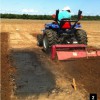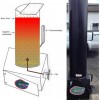 Biochar can potentially provide better conditions in the soil to increase plant growth. However, research has shown that weed species show minimal changes in germination and emergence patterns with the addition of biochar. Regardless, if biochar is used in the field it is important to monitor for changes in weed populations. This is especially important because biochar can decrease herbicide efficacy. This 2-page fact sheet was written by Neeta Soni, Ramon G. Leon, John E. Erickson, and Jason A. Ferrell, and published by the UF Department of Agronomy, March 2015. (Photo: Neeta Soni)
Biochar can potentially provide better conditions in the soil to increase plant growth. However, research has shown that weed species show minimal changes in germination and emergence patterns with the addition of biochar. Regardless, if biochar is used in the field it is important to monitor for changes in weed populations. This is especially important because biochar can decrease herbicide efficacy. This 2-page fact sheet was written by Neeta Soni, Ramon G. Leon, John E. Erickson, and Jason A. Ferrell, and published by the UF Department of Agronomy, March 2015. (Photo: Neeta Soni)
http://edis.ifas.ufl.edu/ag390
Tag: Biochars
Producing biochar using a custom designed Top-lit Updraft (TLUD) gasifier
 Biochar can be produced in a wide variety of ways; some are complex, while others are relatively simple. Researchers at the University of Florida Everglades Research and Education Center in Belle Glade, FL, designed and built a top-lit updraft (TLUD) gasifier that can generate biochar from locally acquired feedstock. This 4-page fact sheet describes its design and evaluates the biochar recovery of four locally available feedstocks. Written by Jehangir H. Bhadha, Stephen Jennewein, Julio Sanchez, and Timothy A. Lang, and published by the UF Department of Soil and Water Science, September 2014.
Biochar can be produced in a wide variety of ways; some are complex, while others are relatively simple. Researchers at the University of Florida Everglades Research and Education Center in Belle Glade, FL, designed and built a top-lit updraft (TLUD) gasifier that can generate biochar from locally acquired feedstock. This 4-page fact sheet describes its design and evaluates the biochar recovery of four locally available feedstocks. Written by Jehangir H. Bhadha, Stephen Jennewein, Julio Sanchez, and Timothy A. Lang, and published by the UF Department of Soil and Water Science, September 2014.
http://edis.ifas.ufl.edu/ss626